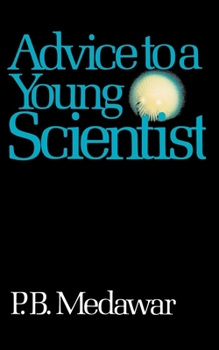Advice to a Young Scientist
Select Format
Select Condition 
Book Overview
To those interested in a life in science, Sir Peter Medawar, Nobel laureate, deflates the myths of invincibility, superiority, and genius; instead, he demonstrates it is common sense and an inquiring mind that are essential to the scientist's calling. He deflates the myths surrounding scientists -- invincibility, superiority, and genius; instead, he argues that it is common sense and an inquiring mind that are essential to the makeup of a scientist...
Format:Paperback
Language:English
ISBN:0465000924
ISBN13:9780465000920
Release Date:July 1981
Publisher:Basic Books
Length:128 Pages
Weight:0.33 lbs.
Dimensions:0.5" x 5.0" x 7.9"
Customer Reviews
2 ratings
You're misunderstanding the purpose of this book
Published by Thriftbooks.com User , 17 years ago
This book is not really giving advice to young scientists, as much as it is a device used to discuss what science really is. Apparently, the author was too subtle about his intention for many readers. It deserves four or five stars like most of Medawar's classic writings.
Excellent Advice to a Young Scientist
Published by Thriftbooks.com User , 23 years ago
Professor Medawar is much aware of following in the footsteps of William Cobbett, (the famous 'Advice to Young Men and (incidentally) to Young Women', written in the early 1800's and still in print), and wishes to avoid being dull and preachy. He is incapable of either, and he here shares his experience of a distinguished career in the biological sciences for the benefit of the aspiring scientist in any research discipline. This book would be useful to anyone entertaining the idea of a science-based career, certainly up to the graduate stage. It is also probably of specific interest to any biologist whether student, teacher, or researcher. This is an original and personal book, by a writer who won a Nobel prize in 1960 for his research in the area of human tissue transplants. He is here both literate and highly practical; the wisdom of a lifetime, normally only acquired slowly by personal life experience, is distilled and decanted with dry humour.The chapters cover: 'How can I tell if I am cut out to be a scientific research worker?', which contains a revealing and exceedingly quick intelligence test, (and which would probably be of great value as a surprise question in executive job interviews). A psychologist would classify this as a very direct test of 'little g', or the general intelligence factor, and it is refreshingly free of bias due to gender, culture, and educational attainment level.The chapter 'What shall I do research on?' contains the observations of a typical biologist, very down to earth. Likewise, 'How can I equip myself to be a scientist?', which contains guidance on balancing reading research with hands on activity. 'Aspects of scientific life and manners' is the best chapter: an excellent set of observations on teamwork, respect for colleagues, the scientist's moral requirement of dedication to Truth, how to handle mistakes, giving fair credit for discoveries, and how to keep your friends (by handling the critical scientific habit of mind correctly! Take notes...). The snobismus (a most excellent neologism) divide between pure and applied science, and between technicians and researchers is also noted and handled well.The professor interestingly distinguishes between four types of experiment. The Baconian or messing around type; the Aristotelian or proving a point type; the Galilean or critical type (the normal type as most think of science today); and the Kantian or thought experiment, much beloved of the other Greeks.'The Scientific Process' analyses and challenges Kuhn's theory of scientific paradigms and paradigm shifts. And the chapter 'Scientific Meliorism versus Scientific Messianism' concerns the psychology and worldview of scientists, and throws some enjoyable light on his debates with C. S. Lewis, whom he knew well. This latter debate proves (although he would deny it), that although he approaches C. P. Snow's ideal of the man who can bridge the two cultures - of those schooled in the humanities, and those in the scie





